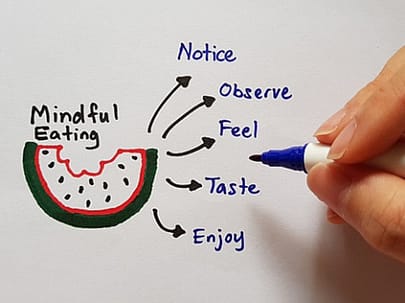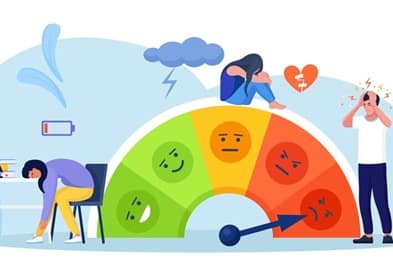Mindful Eating: A Tool for Combating Depression

Introduction to Mindful Eating And How To Use Mindful Eating for Combating Depression
Depression is a mental condition of a person in which the person experiences depression due to something that happened in the past or events or future consequences, displaying persistent feelings of fear, anxiety, apathy, dissatisfaction, emptiness, guilt, and hopelessness in relation to the events.
This type of emotion affects the way a person feels, thinks, and behaves. As a result of this, a person may have to face many types of mental and physical problems. The best depression specialist doctor in Mumbai believes that if there is more than one depression symptom, not adopting necessary preventive measures leads the person towards more depression.
Due to this condition, extreme despair and reduced ability to think can lead a person to commit unwanted acts like suicide or self-harm. The Department of Restorative and Regenerative Medicine at Jaslok Hospital recommends emerging depression treatment approaches for TMS in Mumbai. Apart from this, mindful eating practice is also considered an effective tool to deal with depression.
How Does Mind-Body Connection Work In Mindful Eating?
Your mind and body are connected to each other through a complex system. You’re smiling or laughing when you have happy feelings can be an example of your understanding of the mind-body connection Dr. Paresh Doshi explains that your mental health refers to your level of cognitive or emotional well-being.
General mental health helps you balance your ability to enjoy life and strive to achieve psychological flexibility with life’s activities. While negative emotional states such as stress, depression, anxiety, or obsessive behavior can affect physical functions.
Therefore, targeting obsessive-compulsive symptoms with TMS in Mumbai or finding non-invasive treatments for depression may be an important steps to mindful eating.
According to the doctors at our depression center in Mumbai, a healthy mind is more likely to be in a healthy body. Basic ways to improve your health can help you protect your mind and function better.
These include eating a good diet, getting enough sleep, and exercising. For mindful eating examples, A good nutritional diet supplies minerals to your body, which helps your brain function better. It helps the brain to control mental activities. If you are also struggling with mental health such as mood and outlook, consider a healthy diet. It may help in such conditions.
Jaslok Hospital offers a wide range of services to take care of your psycho-physical health needs. One of those “How does mindful eating affect emotional well-being” discussion is as follows:
Diet and Mental Health
Your mental and physical health are closely related to the food you eat. The diet supplies essential nutrients for brain processes, such as omega-3 plant acids, potassium chloride, and vitamins. However, anorexia was first seen among the mental health disorders that affect your desire to eat. In this, the person’s desire to eat food is not based on physical needs but is based on emotional reasons, which increases stress and mental condition. The best depression specialist doctor in Mumbai believes that when we are going through such mental conditions, excessive consumption of food can lead to obesity (weight gain) in the body. As a result, brain processes are disrupted, leading to increased symptoms of depression and dementia such as low mood, fatigue, decreased health, and irritability. In this, a mindful diet can be very helpful in maintaining mental health. It can not only improve your physical health but can also help improve your mental health. And this way you can have healthy and happy mental health.
How Mindful Eating Influences Emotional Well-being
How does mindful eating reduce stress? Eating mindfully, or becoming mindful of emotional eating in the case of food-related depression, can be important steps to mindful eating for your emotional health as well as your physical health. Mindful eating can impact emotional health in many ways. Depression specialist doctors at TMS depression treatment hospital in Mumbai believe that depression can be caused or increased by a person showing a lack of interest in eating, not enjoying food, and eating food in response to emotions as opposed to the person’s physical needs.
Generally, it May be involved in the emotional behaviour of the person. Emotional eating may cause you to gain weight, lose weight, and cause negative emotions like guilt or embarrassment. If this happens continuously then it will be difficult to get rid of the grip of emotional eating.
Therefore, carefully following mindful eating habits can help your emotional well-being. It helps you promote weight loss or normalization, reduce overeating, or understand food cravings. It helps you feel better and promotes overall health. if you want to know “How mindful eating affects emotional well-being”; then according to the best depression specialist doctors in Mumbai, here are some of the key components:
- Health improvement: Emotional and physical health may improve.
- Prevention of overeating: Can prevent excessive eating, which can keep your weight under control.
- Emotional balance: This can help promote your enjoyment and balance around food.
- Stress Reduction: This can help you create balance and peace in your daily routine.
- Self-Sensation: Helps you gain a deeper understanding of your habits, eating patterns, and food cravings.
- Satisfaction and gratitude: Mindful eating can help you increase gratitude for your food.
What is Mindful Eating?
According to the best depression clinic in Mumbai, Mindful eating involves experiencing the food you choose and using all your physical and emotional senses to enjoy the food, i.e., paying attention to experiences, thoughts, and feelings during your meal. Mindful eating is an approach that encourages you to pay attention to cues such as hunger and satiety; it is one of the techniques to treat depression. In this, you can improve your physical and emotional well-being by developing a compassionate and non-judgmental relationship with food.
Principles of Mindful Eating
According to the neurologists at our TMS depression treatment hospital in Mumbai, it is important for you to practice mindful eating by focusing on the context of the food interaction and the experiences, thoughts, and feelings that arise during the meal. This involves the practice of eating your food while paying attention without getting distracted. Such as:
- Present-moment awareness: Mindful eating encourages you to be fully aware when eating, and to enjoy the food. This means you have to focus on the act of eating, rather than avoiding eating while watching television, with a smartphone, or voraciously.
- Sensory awareness: The sensory pleasure of eating is the process of focusing on the sensory aspects of food, such as texture, aroma, and appearance.
- Non-judgmental observation: Try to observe the positive experiences of your food without having negative thoughts or criticisms about your food.
- Purposeful eating: Instead of eating out of emotional hunger, boredom, stress, or mindful eating habits, focus on why you’re eating. That means you focus on your physical needs (nutrients and calories). Mindful eating helps you face conscious challenges about when and what to eat.
- Eat slowly: Eat slowly to enjoy every bite and allow your body to reach fullness. This can avoid increasing fullness.
- Listening to your body’s signals: Pay attention to your body’s signals of hunger and fullness. Understanding that you’re hungry and feeling satisfied can keep you from eating on autopilot.
Techniques for Cultivating Mindful Eating Habits
- Eating your food in small portions at frequent intervals as needed, or in moderate amounts.
- Before eating, consider and pay attention to some basic things like
- Are you hungry, or how much should we eat?
- Determine a good place to eat and arrange the food properly on the plate and eat it comfortably.
- While eating, take a smaller plate and eat it in small pieces.
- Understand the smell, taste, and texture of food and its importance and purpose, like which other nutrients apart from the protein we get from cheese and in what quantity our body requires it.
- Eat by keeping the food plate down instead of holding it in your hand.
- Set the time for eating food,
- Give importance to the calorie or usefulness of food instead of its quantity.
- Avoid eating food under pressure.
- Enjoying a meal with your family and friends can create a supportive and positive environment.
How To Overcome Depression And Anxiety With Mindful Eating?
The Department of Restorative and Regenerative Medicine at Jaslok Hospital considers mindful eating important in recommending emerging depression treatment approaches for TMS in Mumbai.
When we talk about the impact of mindful eating for depression relief, everything from food to mindful eating techniques is included in it. And when it comes to depression, we talk about physical as well as mental health. Mindful eating practices are used as an effective tool in mindful eating for depression relief. Because the state of depression usually reflects mental and physical weakness. In such a situation, not getting proper nutrients to the body and mind can be a possible reason for its increase.
By now you must have understood that the entire concept of mindful eating is to provide food and nutrients to a person in the right quantity, which can improve his physical health as well as his emotional health. However, many researches have proven that mindful eating helps prevent or improve many health problems like depression, anxiety, obesity, etc.
Reducing Emotional Eating Patterns
Reducing emotional eating patterns can help you to reduce or prevent the cycle of emotional eating, but you first need to understand the difference between emotional and physical hunger. The best depression specialist doctor in Mumbai explains that generally, you use food regularly to cope with your emotions (cravings), whereas physical hunger is about you using food for nutritional reasons. To combat emotional eating or control your cravings, try these tips from the neurologists at our depression clinic in Mumbai:
- Make a food diary: Write what, how much, when, and why you eat.
- Work on stress: Stress, in general, can add to your emotional eating, so try stress management techniques, like yoga, or deep breathing.
- Reality Check Hunger: Whether it’s physical hunger or emotional hunger? If you’ve eaten just a few hours ago, you’re probably craving, not hungry. try an alternative to make the craving work (think about not eating).
- Avoid boredom: Use distractions and healthy behaviors (walking, playing, or listening to music) instead of food (chips, corn, or biscuits) to pass the time.
- Don’t get tempted by food type: Do not keep easily digestible or favourite foods in your house. Eat nutritious low-calorie or protein-rich foods that keep you full for longer.
- Exercise: Exercise can help you lose weight by reducing cravings and limiting excess calories.
- Avoid too many food choices: Try to eat the same type of food (healthy) repeatedly, and enjoy alternative food occasionally.
- Breakfast healthy: When you feel cravings between meals, opt for a healthy snack such as fresh fruits, salad, vegetables, nuts, or butter-free popcorn.
- Learn from failures: If you have an episode of emotional eating, make a plan for how you can stop it in the future. Forgive yourself if you make any mistakes and start fresh the next day. Thus, focus on positive changes in your eating habits and give yourself credit for those changes that will lead to better health.
How To Improve Mental Health with Nutritional Intake?
There are some important ways to help in depression treatment by consuming proper nutrition. Here are a few suggestions:
- Self-Compassion: Practice accepting yourself and being kind to yourself. Getting yourself right with your eating patterns and accepting mistakes will help.
- Balanced Diet: Follow a balanced diet, which includes protein, nutrition, fiber, vitamins, and minerals in the right amounts at the right time.
- Meal Timing: Make a regular meal time and make meal time pleasant to make the atmosphere worthy.
- Nutritional Literacy: Read the nutrition labels on your foods and educate yourself to increase your literacy.
- Hydration: Drinking enough water can improve your mental health because dehydration (lack of water in the body) can affect your mental health.
- Consumption of Fruits and Vegetables: Do not live without eating fruits and vegetables daily. These can help improve and stabilize your mental health.
- Nutrient-rich foods: Include nutrient-rich foods in your diet, such as nuts, beans, dried fruits, fruits, Vegetables and sun-dried fruits.
- Healthy Fats: Use healthy oils in your diet, such as olive oil, and coconut oil, and walnut oil.
- Limit Sugar and Processed Foods: Reduce your intake of sugar and processed foods, as excess of these can cause depletion and stress in the body.
- Mindful Eating: Try to eat your food mindfully and consider eating time as a spiritual practice.
How Do You Cultivate Mindful Eating? Steps To Mindful Eating
As an essential step to incorporate mindful eating into your daily routine, it is important to be conscious of your lifestyle towards conscious eating practices. According to TMS depression treatment doctor in Mumbai, you should pay attention to every bite that you are eating. In today’s busy and stressful lifestyle, you often become so mindless towards food while eating that while you are busy with your phone or with other tasks, you eat food in a hurry out of emotional desire or just with the intention of filling your stomach. In such a situation, we are neither able to enjoy food, nor are we able to understand its purpose. In such a situation, the major tips for the Mindful Eating approach in the Department of Restorative and Regenerative Medicine at Jaslok Hospital are as follows:
- Create a practice of mindful eating: Be fully present when eating. When you put more thought into what you eat, you can make your meals more mindful.
- Make good food choices: Choose healthy and nutrition-rich foods. You can consume nutritious foods like natural fruits, vegetables, eggs, pulses, grains, and nuts.
- Portion control: You should make sure to control the quantity of food and avoid overeating.
- Mealtimes: Create regular mealtimes and make mealtimes pleasant and mindful.
- Eat Slow: Chewing and swallowing food slowly helps you eat your food consciously and know in advance whether you are hungry or not.
- Small meals throughout the day: Try to eat small meals throughout the day instead of big meals. This can help you eat more mindfully and mindfully.
- Say thank you carefully: Say thank you carefully at the beginning of your meal. This can help with support and knowing your meal ahead of time.
- Avoid the tendency to overeat: Follow the best ways to avoid the tendency to overeat, depending on the situation, food, or emotions.
- Balance of healthy and tasty food: Strike a balance between healthy and tasty food. You can make your meals conscious and enjoyable by following healthy eating methods.
- Make time: Make mealtimes a time of mindfulness and meditation for yourself, and become fully engaged with your food.
Being mindful of the food you eat can promote better digestion, and physical and mental health, keep you satiated with less food, and influence wise choices about what you’ll eat in the future. It can also help you get rid of unhealthy eating habits. Thus mindful eating can be an important tool that can help deal with depression. Mindful eating is the process of being conscious and mindful of your food and eating it by chewing, savoring, and without pressure. This technique can help you eat your food with pleasure and satisfaction, thereby improving your mental health. This can help you recognize the emotions and pain associated with food and encourage more conscious and mindful eating. If you are experiencing mental and physical health issues related to your eating, the Department of RNR Medicine at Jaslok Hospital has detailed tips on the mindful eating approach. Jaslok Hospital is considered to be the best depression clinic in Mumbai. Our expert care has helped individuals recover from depression and live an overall healthy life. Depression is a common and serious medical illness that negatively affects the way you feel, the way you think, and the way you function. , Fortunately, it is also treatable. Depression causes a feeling of sadness and loss of interest in activities you once enjoyed. This can lead to various emotional and physical problems and reduce your ability to function. The hospital also offers innovative treatments such as repetitive transcranial magnetic stimulation (TMS) for severe depression. Thousands of depression patients have been successfully treated at Jaslok Hospital.
Best Hospital for TMS for Depression in Mumbai
Jaslok Hospital is the best hospital for TMS for depression in Mumbai. Jaslok Hospital’s TMS treatment is conducted by experienced technicians who customize all your treatment plans. Mindful eating is a mental health technique and TMS is a non-invasive method of neuromodulation. Our expert care has helped individuals recover from depression and live an overall healthy life by implementing mindful eating practices. The hospital successfully implements innovative treatment methods like repetitive transcranial magnetic therapy in the treatment of depression. It involves low-energy magnetic stimulation of a particular site of the brain through the scalp. This procedure uses magnetic pulses to stimulate the brain and is effective in treating depression. Jaslok Hospital is equipped with state-of-the-art technology and is committed to providing. We help you take care of your personal health and comprehensive depression diagnosis treatment.








